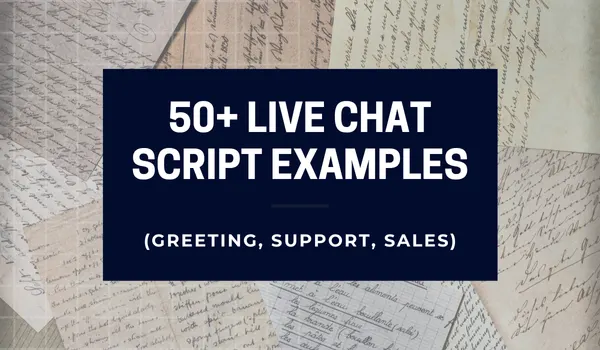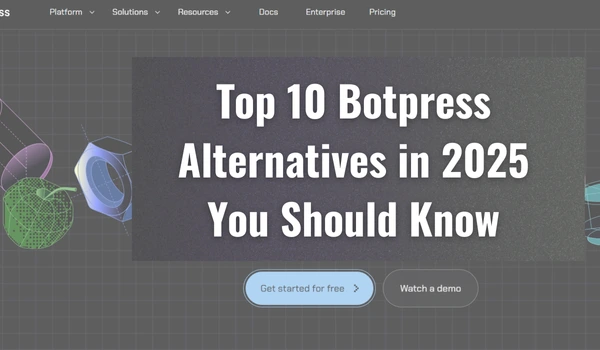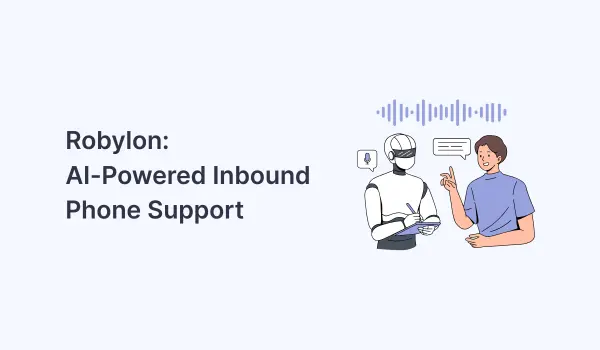TL;DR
This guide compares the best LiveChat alternatives for 2025 across AI features, channels, ticketing, and pricing. Good fits by size include;
- Small teams: Website chat, basic bots, email handoff
- Mid-market: Multichannel inbox, AI chat agents, helpdesk sync
- Enterprise: Full omnichannel support, voice, and audit logs
Strong picks
- AI + voice automation: Robylon
- In-app experiences: Intercom
- Enterprise ticketing: Zendesk
- Budget SMB chat: Tidio, LiveAgent, Olark
- Open source or self-hosted: Chatwoot.
Introduction: LiveChat Alternatives for 2025
This guide lists reliable LiveChat alternatives for different team sizes and use cases. It covers AI features, channels, integrations, and support workflows so teams can compare tools and move fast.
Many teams outgrow LiveChat. Bills rise as volume grows. The interface slows agents down. Advanced automation or omnichannel support is missing or costs more than planned. These gaps affect response times, CSAT, and cost per ticket.
In the sections below, we review 10 LiveChat competitors that maximize speed, reduce effort, and keep costs predictable. Use this guide to shortlist two or three tools. Focus on four checks
- Automation depth: Real AI chat agents, routing, and safe handoff
- Channel coverage: Web chat, email, WhatsApp, voice, and social
- Helpdesk fit: Built-in ticketing system or easy link to your helpdesk
- Time to value: Setup in hours or days, not weeks
Book a demo to know more.
What is LiveChat?
LiveChat is a live chat software that adds a chat widget to your site and connects visitors to agents in real-time. It offers messaging, basic routing, and integrations with popular tools. Key features include;
- Automated greetings: Nudge visitors to start a chat for faster engagement
- Ticket tagging & follow-ups: Keep context and ensure timely responses
- Message sneak-peek: Agents preview typing and respond quickly
- Reports & dashboards: View resolution trends and satisfaction scores
Downsides of LiveChat’s Platform
- Bots sold separately: No in-built bots; requires their ChatBot product
- Higher total cost: Two products for chat + bots increase the total cost of ownership (TCO)
- Learning curve: New teams need time to configure and train
- Pricing pressure: Costs rise with agent seats and features
- Customization limits: Branding and widget controls trail flexible rivals
- Reported delays: Some users note slow responses during busy periods
Why Look for Alternatives to LiveChat?
- Pricing: Seat-based and add-ons grow costs as teams scale
- Customizability: Complex flows and branding often need workarounds
- Integrations: Some alternatives offer broader or deeper CRM and data links
- Limited advanced AI: Complex, context-aware flows need add-ons or external tools.
- Learning curve: Non-intuitive setup increases training time.
- Performance concerns: Some users report lags and slow support.
- Omnichannel gaps: Managing web chat, WhatsApp, and email across tools creates silos. Level up your mix with our customer service channels playbook
Top Ten LiveChat Competitors to Consider
1) Robylon

Robylon provides AI chat and voice agents with native ticketing, knowledge, and omnichannel routing. Teams deploy automated support and sales workflows with fast setup and clear analytics.
Best Use Case: AI-first automation across chat, voice, and tickets for teams that want lower handling time and fewer tools.
Key Features
- AI Chat Agent for FAQs, orders, refunds, KYC, and status checks
- AI Voice Agent with context carryover and human handoff
- Ticket Automation with triggers, SLAs, and tags
- Knowledge Base AI that turns docs into safe answers
Automation: Agents trigger workflows via intents, memory, and secure tool calls; human handoff includes a full transcript.
Pricing: Free; Starter $39/mo; Business $199/mo; Custom Enterprise plans available
Industry: Ecommerce, fintech, SaaS, logistics, healthcare, marketplaces.
Limitations: Needs a short implementation to connect data and map policies before scaling automation reliably, and regulated tasks require tighter guardrails and review.
Why Better than LiveChat?
Robylon adds AI and voice automation, built-in ticketing, and clear analytics, so you use fewer tools and launch faster. Its Knowledge Base agent is fully customizable to your content and policies. It also delivers true omnichannel support across Chat, WhatsApp, Email, social media, and Voice. Build your stack faster, browse 40+ Robylon integrations.
2) Intercom
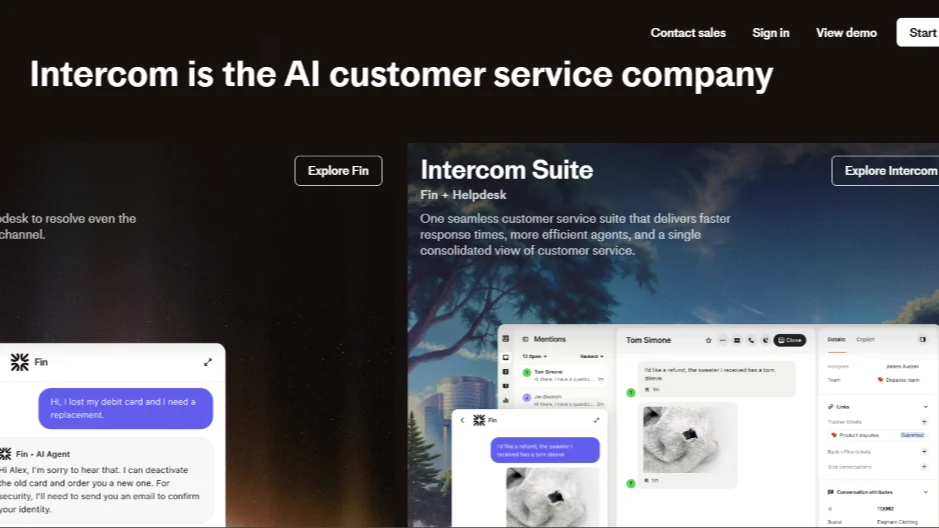
Intercom is a customer service platform featuring Fin AI Agent, a shared inbox, a help center, and outbound tools, offering a robust in-app experience for SaaS companies.
Best Use Case: Product companies need a unified messenger, help center, proactive tours, and AI-driven resolution pricing.
Key Features
- Fin AI Agent with resolution-based billing
- Unified inbox with tickets, SLAs, and reporting
- App store ecosystem and in-app messenger
- Proactive Support for tours and surveys
Automation: Fin resolves conversations; Copilot assists agents inside the inbox.
Pricing: Fin AI Agent $0.99 per resolved conversation; suite pricing starts from $29/seat with usage-based add-ons
Industry: SaaS, consumer apps, PLG businesses
Limitations: Seat and usage add-ons raise the total cost of ownership quickly; careful forecasting is needed for volumes and advanced features
Why Better than LiveChat?
Stronger in-app tooling and AI resolution model; broader ecosystem than a chat-centric product.
3) Zendesk (Suite with Messaging)
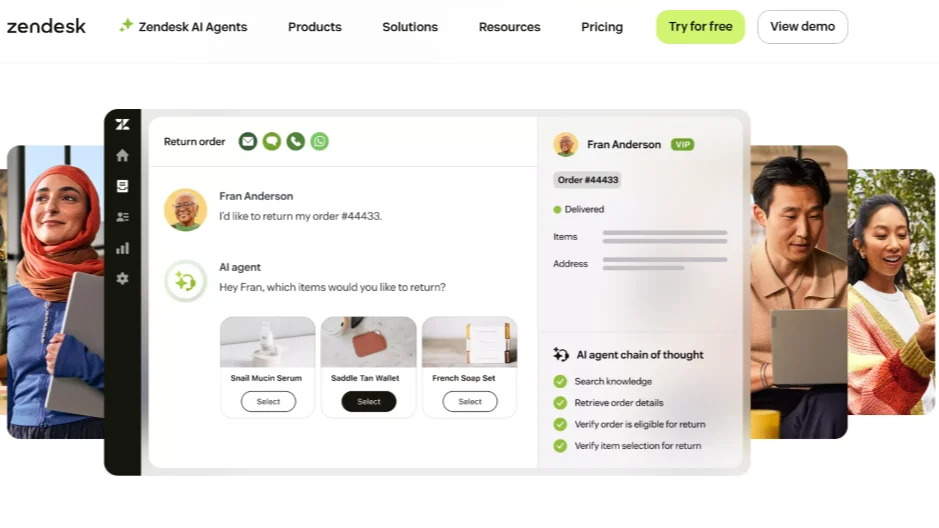
Zendesk offers an enterprise service suite: ticketing, messaging/live chat, knowledge base, voice, QA, and WFM. Built for scale and governance.
Best Use Case: Omnichannel ticketing at scale with roles, SLAs, analytics, and large marketplace integrations.
Key Features
- Robust ticketing with skills routing and SLAs
- Messaging/live chat tied to the help center
- AI agents, Copilot, QA, and WFM add-ons
- 1,000+ integrations and admin controls
Automation: AI agents automate resolutions; Copilot assists agents with recommendations and actions.
Pricing: Zendesk Suite plans start at $55/agent/month (annual billing)
Industry: Retail, fintech, telecom, SaaS, contact centers
Limitations: Complex setup; per-agent pricing and add-ons can increase total cost for large teams
Why Better than LiveChat?
Full helpdesk suite beyond chat with enterprise analytics and governance; tighter ticketing than LiveChat.
4) Tidio
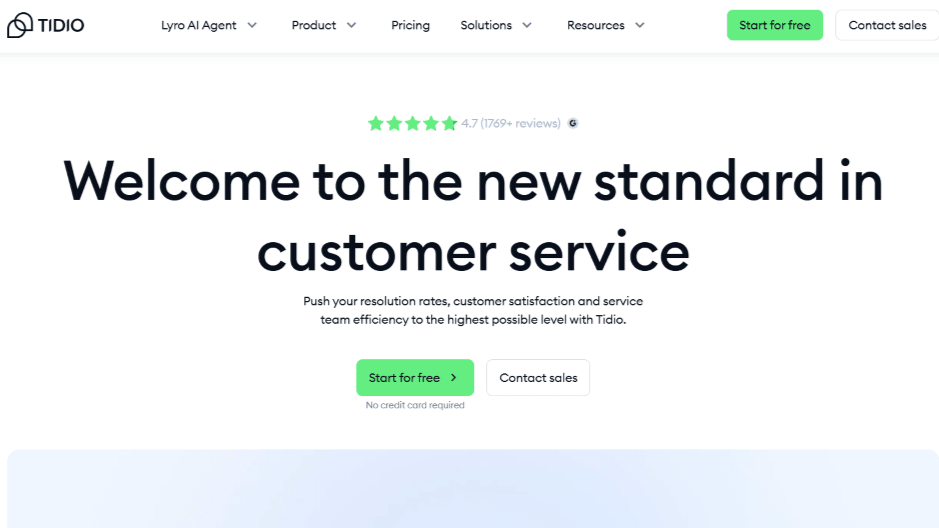
Tidio combines live chat, multichannel inbox, and Lyro AI bots with conversation-based limits. Designed for SMBs and ecommerce.
Best Use Case: Quick deployment with templates and affordable automation for storefronts and small teams.
Key Features
- Lyro AI for automated FAQs and handoffs
- Unified inbox for chat, Instagram, Messenger, and email
- Customizable widget and proactive triggers
- Real-time visitor tracking and analytics
Automation: AI chatbots and flows scale by monthly billable conversations.
Pricing: Starter $24.17/mo; Growth from $49.17/mo; Plus from $749/mo; Premium on request
Industry: SMB, D2C, e-commerce
Limitations: Conversation caps can throttle during peak; advanced analytics and routing trail enterprise suites
Why Better than LiveChat?
Lower entry price and faster setup; conversation-based pricing fits low-to-mid volume sites better
5) LiveAgent

LiveAgent unifies helpdesk ticketing, live chat, and call center features in one platform. It is known for value pricing.
Best Use Case: Teams that want email ticketing and chat together with SLAs and business hours.
Key Features
- Email ticketing with collision detection
- Live chat with proactive invitations
- Built-in call center and knowledge base
- SLA management and business hours
Automation: Rules, canned actions, and routing automate common workflows across channels.
Pricing: Plans start at $15/agent/month; higher tiers add channels and features
Industry: SMB, agencies, support-heavy teams
Limitations: Interface feels dated; social and SMS depth is lighter than modern omnichannel platforms
Why Better than LiveChat?
Cheaper per-agent entry with native ticketing; practical for replacing email + chat together.
6) Olark
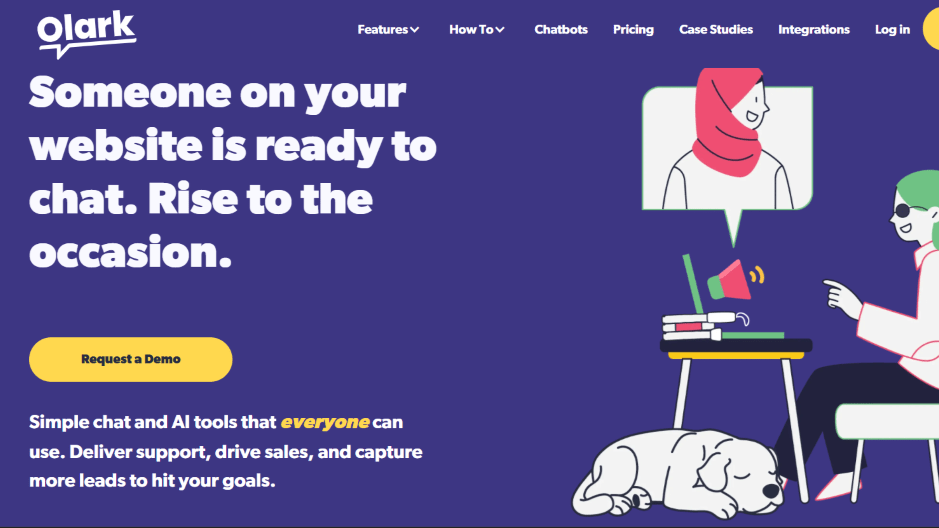
Olark is a straightforward website live chat tool with transcripts, routing, and reporting, focused on small teams.
Best Use Case: It offers simple web chat with basic automation and easy setup without heavy admin work.
Key Features
- Customizable chat widget and forms
- Transcript archive with search
- Routing and team management
- Integrations with CRM/ecommerce tools
Automation: Rules and lightweight automations; optional “PowerUps” extend capability.
Pricing: Standard $29/seat/month; Pro is quoted by sales
Industry: Small businesses, boutiques, nonprofits.
Limitations: Limited advanced automation and analytics; many add-ons raise cost for growing teams.
Why Better than LiveChat?
Lower cost and simpler rollout for web-only support versus LiveChat’s expanding add-ons.
7) HelpCrunch

HelpCrunch combines live chat, chatbot, shared inbox, knowledge base, email marketing, and pop-ups, aiming to support and engage.
Best Use Case: SMBs wanting chat plus email campaigns and pop-ups in one tool
Key Features
- Live chat with proactive messages
- AI chatbot and auto-messages
- Knowledge base and shared inbox
- Email campaigns with segmentation
Automation: AI Agents available on Pro/Unlimited; usage can be extended with paid AI conversation add-ons.
Pricing: Aggregators list Basic $15/user/mo and Pro $25/user/mo; Unlimited/Enterprise on request or higher
Industry: SMB, SaaS, and e-commerce
Limitations: Pricing details vary and features differ by plan; verify AI limits and email volumes before purchase
Why Better than LiveChat?
Built-in email, chat, and KB reduce tool count; native marketing flows out of the box.
8) Crisp
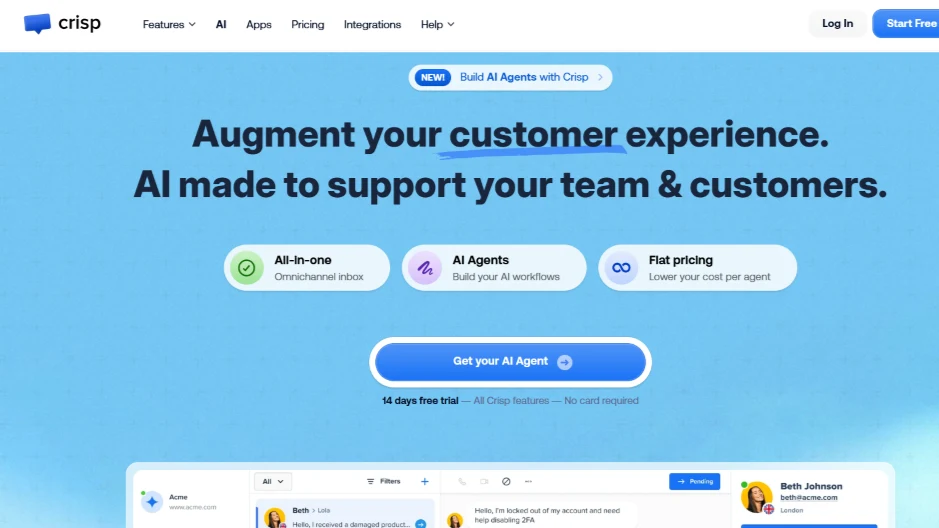
Crisp is an all-in-one messaging platform with a shared inbox, knowledge base, chatbot, and campaigns.
Best Use Case: Startups and mid-market teams wanting predictable workspace pricing and social channel coverage.
Key Features
- Omnichannel inbox (web, WhatsApp, Instagram, SMS)
- Visual workflow automation and AI chatbot
- Knowledge base and ticket portal
- Campaigns and status page
Automation: No-code flows; Plus tier includes unlimited AI-powered resolutions.
Pricing: Free; Mini $45/mo, Essentials $95/mo, Plus $295/mo per workspace
Industry: Startups, SaaS, e-commerce
Limitations: Seat allowances per tier; advanced analytics/SLAs and capacity live on higher plans
Why Better than LiveChat?
Predictable workspace billing with bundled AI bot; wider social channels than a chat-only stack.
9) Chatwoot (Open Source + Cloud)
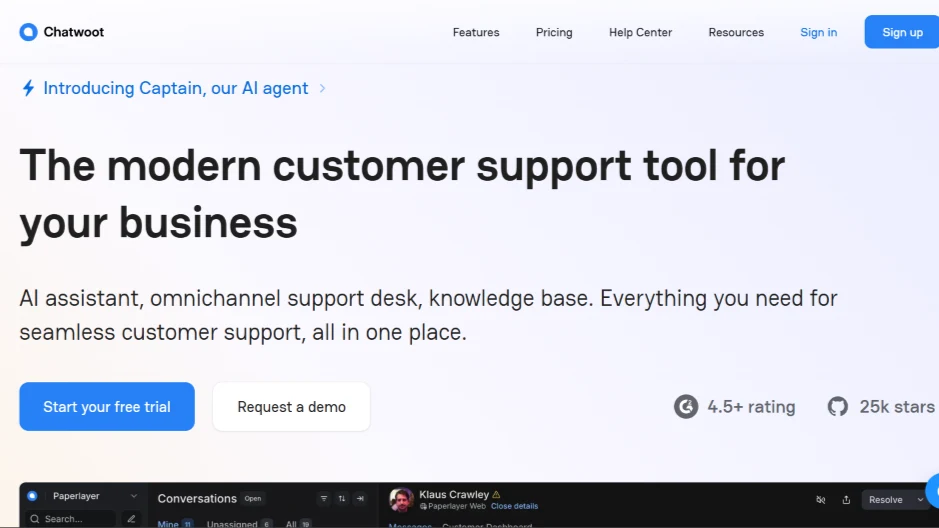
Chatwoot is an open-source engagement platform with live chat and multichannel inbox; available self-hosted or on the cloud.
Best Use Case: Engineering-friendly teams needing self-hosting, data control, or low-cost cloud with core features.
Key Features
- Website chat with unified inbox
- WhatsApp, Instagram, Telegram, SMS integrations
- Help center, analytics, and rules
- Free “Hacker” tier (limited agents)
Automation: Auto-assignment and rules; bot integrations; self-host enables deep customization.
Pricing: Cloud tiers commonly $19/$39/$99 per agent/mo; self-hosted plans from $19/agent/mo
Industry: SaaS, startups, public sector, privacy-sensitive teams
Limitations: Advanced automations are lighter than big suites; self-hosting requires DevOps expertise and maintenance capacity
Why Better than LiveChat?
Open-source flexibility and lower entry price; broader channel mix and control options.
10) Freshchat (Freshdesk Messaging)
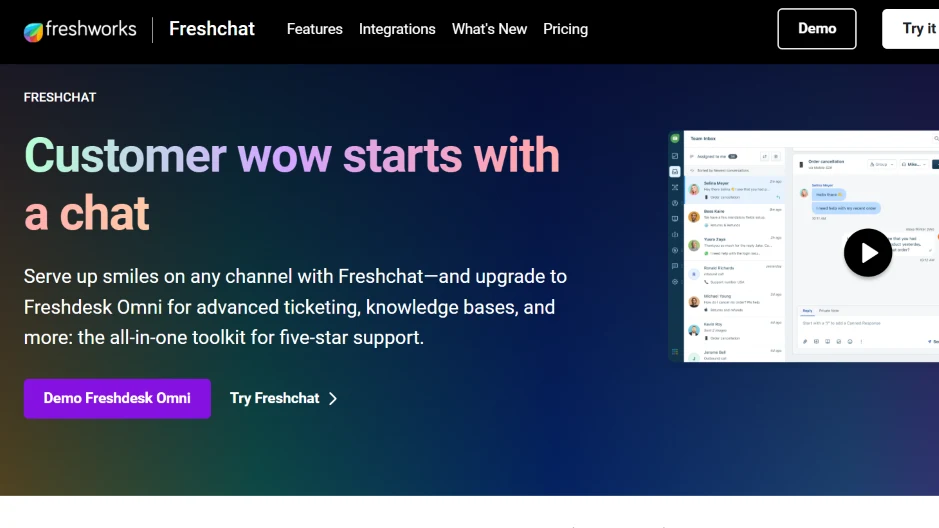
Freshchat (Freshdesk Messaging) offers live chat, bots, and multichannel messaging within the Freshworks suite with a tight link to Freshdesk helpdesk.
Best Use Case: Teams on Freshworks seeking chat, bot, and ticketing alignment with a simple rollout.
Key Features
- Live chat with unified agent workspace
- AI/chatbots and proactive campaigns
- WhatsApp, SMS, and social channels
- KB integration via Freshdesk
Automation: Bot sessions included per tier; rules automate triage and routing across channels.
Pricing: Plans from $19/agent/mo, with free and enterprise options
Industry: SaaS, SMB, e-commerce on Freshworks
Limitations: Feature splits between Freshdesk and Freshchat add complexity; ensure bot/session limits match forecasted volumes.
Why Better than LiveChat?
Native path to full helpdesk and bots in one vendor suite; stronger omnichannel alignment than chat-only tools.
10 Best LiveChat Competitors in 2025
Why Robylon Is the Best LiveChat Alternative
Robylon replaces a patchwork of chat, bot, and ticketing tools with one AI-first platform. You get AI chat, AI voice, native ticketing, and knowledge automation that work together from day one, so teams resolve more with fewer clicks and lower cost.
What do you get in one stack?
- AI Chat Agent answers FAQs, order status, refunds, KYC, and policy questions with safe handoff to humans.
- AI Voice Agent handles inbound/outbound calls, verifications, reminders, and updates with conversation memory.
- Ticket Automation enforces SLAs, tags, routing, and approvals without extra plugins.
- Knowledge Base AI turns your docs into accurate answers with guardrails, citations, and version control.
- Omnichannel coverage across website chat, WhatsApp, email, and voice managed in one workspace.
- Analytics show self-serve rate, first-response time, deflection, and cost per contact.
Where Robylon beats LiveChat (and most look-alikes)
- Bots are built in: No separate bot product to buy or wire up
- Voice is included: Add call workflows without a second vendor
- Tickets are native: Routing, SLAs, and reporting live in the same place as chat/voice
- Faster setup: Import FAQs, connect channels, publish flows measured in hours, not weeks
- Cleaner costs: Plans scale by real usage; fewer add-ons to manage
- Flexible knowledge: Customize responses to your policies, tone, and data access rules
Robylon brings AI chat, voice, and ticketing under one roof with clear analytics and fast setup.
Book a demo to get a tailored walkthrough for your stack
Conclusion
This guide compares the Best LiveChat alternatives for 2025, and while considering these competitors, check channels, automation depth, helpdesk fit, integrations, setup speed, cost fit, and security.
Several tools go beyond a chat widget, platforms like Robylon add AI chat agents, voice, and native ticketing; Intercom excels at in-app experiences with Fin; Zendesk brings enterprise-grade ticketing and analytics; Tidio, LiveAgent, and Olark keep costs predictable for small teams; Chatwoot offers open-source control; Crisp provides workspace-based pricing with social channels; Freshchat ties tightly into the Freshworks suite.
If you need AI + voice automation with ticketing and clear analytics, start with a live walkthrough using your own FAQs and policies. Browse Customer Stories to see outcomes before you commit.
FAQs
How do I migrate from LiveChat without downtime?
Export your FAQs and tags, map them into the new knowledge base, rebuild top workflows, and run both widgets for one to two weeks. Track resolution rate and agent workload before the full cutover.
Are there open-source LiveChat alternatives?
Yes, Chatwoot provides open-source chat and optional self-hosting. It suits teams that want data control and can handle basic DevOps.
What is the best LiveChat alternative with AI?
Robylon focuses on AI chat agents and voice with native ticketing and analytics. Intercom’s Fin uses resolution-based pricing for AI answers inside an in-app experience.
Which LiveChat alternative is best for small businesses?
Robylon and LiveAgent fit small teams that need fast setup, a chat widget, and simple workflows. They keep costs low while covering tasks like FAQs and order status.
What are the best free LiveChat alternatives?
Robylon, Tidio, and Chatwoot offer free or low-cost entry for small teams. Olark runs a simple paid plan at a low price point.

.png)



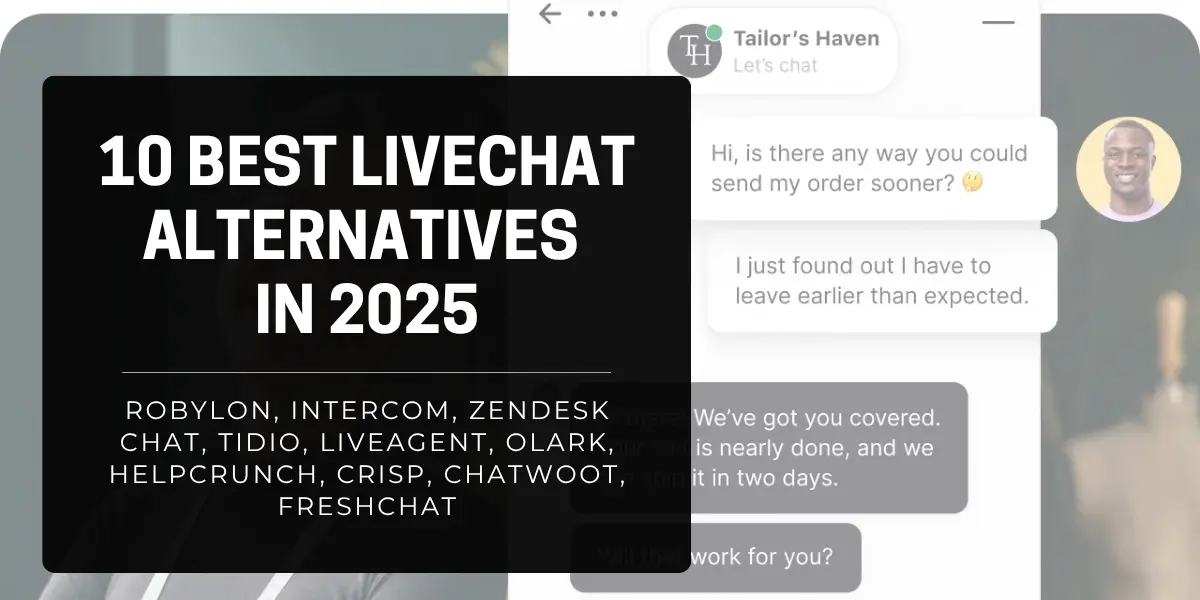
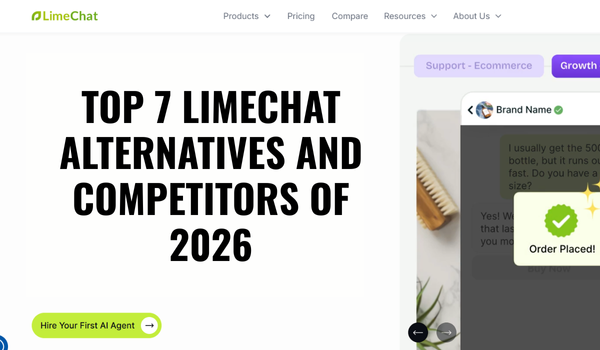


.webp)
